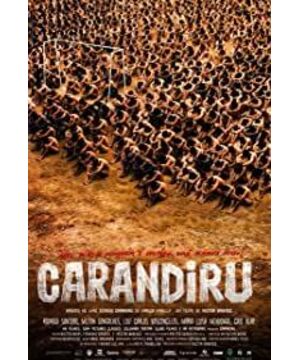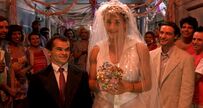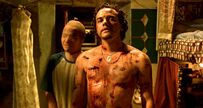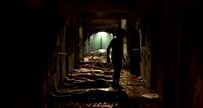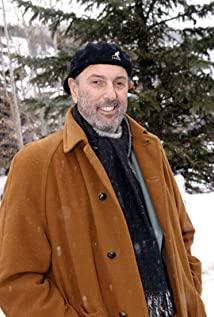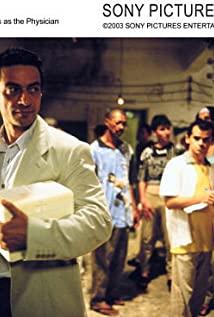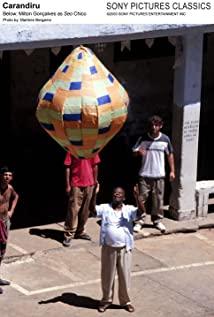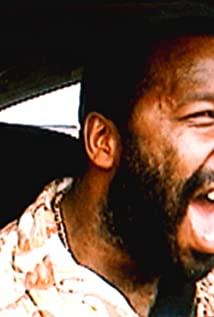's films about prisons are generally unbearable.
The Price of "Collective Unconsciousness" In the
Old Testament, Noah followed Jehovah's will to build an ark and climb Mount Ararat. It was "true knowledge" that saved him from being killed; Socrates once confirmed that "true knowledge must produce right behavior", which has been passed down to this day. This awareness is probably already ingrained in people's hearts. However, this concept can only exist at the conceptual level. Freud's theory of "individual unconsciousness" and Jung's theory of "collective unconsciousness" undoubtedly subverted the previous theories. Perhaps we still don’t know much about the impact of changes in philosophical theory on human behavior and the extent of its impact, but reality always shows us the complex world in the form of a mirror, intuitive and not rigid. I am reluctant to mention some "events" that make me and everyone unhappy, or just cater to some people with ulterior motives. So, I talk about movies, I talk about the "collective unconscious" in [Karandirou].
In 2001, a film that dazzled the world came out, the Brazilian film City of God. To some extent, we can see the shadow of the "collective unconscious" in [City of God]. The "City of God" is a place where the government consciously built a city to accommodate those homeless refugees. However, such a primitive inhabited city built under the guidance of goodwill is not without incident. Although the film attempts to explain the origin of the "unconsciousness", the trivialization of violence and overly gorgeous editing skills greatly reduce the film's speculative power. And shortly after that, we see Amores Perros by Mexican director Alejandro Gonzales. The violence in [Love is like a son of a bitch] somewhat insinuates the influence of social consciousness on the behavior of individual human beings. The three paragraphs in the film are skillfully mixed together by the director, tapping the most vulnerable human heart with a three-dimensional and full narrative structure. Individual fate is controlled by "unconscious" behavior, and the complexity and complexity of society echoes the swaying and chaos of characters' fate. But the kaleidoscope-like narrative puzzle can only make the film stay at the level of film and television works at best.
[Karan Dilu] depicts the state of "collective unconsciousness" in a particularly restrained manner. It sheds the preaching and pretense of the subject itself, and skillfully connects and sews a personal story with astonishing coldness, and outlines the prison for the audience. Group portrait of prisoners. These prisoners understand the appearance of the world in which they live, but not the nature of the world. In 1991, Barbara Kopple's documentary "American Dream" recorded the ugly faces of American politicians who advocated liberal democracy, Oliver Stone's film "JFK" (JFK) and the Thirteen days of the Cuban Missile Crisis exposed the ignorance of the people by politicians from one side. In Karandiru Prison, the prisoners did not realize the nature of the government and the police as a violent institution in the country. They foolishly thought that the cessation of their actions would be a bargaining chip for a peaceful solution to the problem. Consequences have no concept, no awareness. When their blood starts to boil, everything starts to spiral out of control. In a state of "collective unconsciousness," the entire Calandiru boils, burns, and chaotic. While enjoying the unbridled violence, they are also venting their uncontrollable emotions aimlessly. This emotion is mixed with hatred, loss, resentment and dissatisfaction, and it simply reaches its peak easily without conscious preparation. As one survivor put it, "There is no truth in prison," and there is no reason in prison.
However, the "unconscious" pleasure only existed for a moment, and a more crazy "unconscious" quickly swept the entire Karandiru. The hearts of riot police are not thinking about right and wrong, good and evil, justice and evil. The machine guns and bullets in their hands seem to be the embodiment of justice. Their choice of shooting or forgiveness only exists in those who pull the trigger. For a moment. The judgment of this momentary behavior only swept across the cerebral cortex of the policemen, and then escaped without a trace. They may not yet understand whether all this stems from the killing nature of human beings or the cold orders of their superiors, who are just numb to perform tasks and complete their duties.
people struggling to survive
As an unfaithful recorder of world phenomena, the film has recorded countless figures of marginalized people, polio patient Daniel Lewis in My Left Foot, Natural Born Killers. Woody Harrelson and Juliet Lewis in Born Killer, Dustin Hoffman in Midnight Cowboy, Thief in A Bout De Souffle Jean Belmondo and the sex book mogul Geoffrey Rush in Quills are vivid film and television characters who are both marginalized people forgotten by society and who also wrote for the world. A song of life, or struggle, or frivolity, or distress, or helplessness, or lust...
The Carandilu Prison in Sao Paulo, Brazil, the largest prison in South America, holds more than 7,000 prisoners in a small space. Such a group is not as heinous as the outside world has condemned. Many of them are not "natural born killers", and many of them are not on the fringes, but they all share the same destiny, and together they have gone to the corners of the fringes. Body and soul are imprisoned in a filthy, plague-ridden prison. Let's take a look at the journey of these marginalized people to their respective destiny paths.
In a robbery of jewels, Alberni shoots his comrade suspiciously, and another comrade foolishly thinks that he can be redeemed by selling him. The suffering people were ruthlessly condemned by life, but they demanded from life intensified. Individual ignorance and hatred made Albany punished even more cruelly.
Haynes is a tramp. He's unruly in appearance and wild in personality, and the only way he can solve his problems is to pull out his revolver. However, a man is infatuated with two women of different skin colors. Unrepressed desire and blindness to responsibility make him wander between the two women. When the fate of a man is controlled by two women at the same time, the man will always show difficulty. The cowardice of containment, he unintentionally hurt two women, and let himself eat the crime of "arsonist".
Dursted is a murderer, but his murder is out of frustration. His sister, Francie, was insulted once, and Dursted, in a rage, asked his friend Zick for a gun. However, he killed the two men who had insulted his sister because of their provocation and threats. Anger and hatred inspired his sins, how insignificant conscience was on impulse, it only flashed for a moment and then vanished.
Milo is a robber. His accomplices revealed that Milo's wife had a relationship with a policeman, but his wife's anti-divorce plan made him resolutely break with his accomplices. He originally planned to settle down and live a normal life, but the reality always far from ideal. He was betrayed by his wife and almost lost his life at the hands of two policemen. In helplessness and resentment, he shot and killed his sinister and despicable wife in front of his son. Three lives put him in prison, and when he was dying a few years later, he expressed his wish that had not been done for many years in front of the doctor: "Will the child remember everything we did?"
Whether it was the arsonist mentioned above, the robber Criminals or murderers, one of their common destinations is Karandiru Prison. In Carandi Rune, their characters and temperaments have been continued, and this continuation is no longer simple. After the marginal characters have been tortured by life and abused by jailers, their behavior has shown unimaginable cruelty and barbarism. What's more, Karandilu's tolerance and connivance to this cruelty and savagery also indicates that the riots are not accidental.
The drug dealer Zike did not fulfill his promise: "Those who sell drugs, don't take drugs." After entering Karandiru, he couldn't help but fall into the vortex of drugs, and the relationship between people was reduced to transactions and inducements. He is afraid of the outside world, and the psychedelic dreams pinned on him are always nightmare-like hatred that cannot be relieved. So one night, he poured hot boiling water on Izaquier's face, how shocking the insignificance and helplessness of life seemed at this time. Carandiru has his own rules, and any deviation from and defiance of the rules will be punished more severely. Zik was ended by Daigo and Haynes in his short life, in a cruel way that surpassed the limits of people's tolerance. The thrill of revenge only existed in Daigo for a moment. In pain, he was at a loss in the heavy rain. Daigo, who could not face himself, was condemned in his heart. On this night, his fate was changed through the influence of the priest.
However, people's fate is always pulled by the ulterior. Even if they struggled desperately, trying to grab any straw that could save their lives in the process of falling into the abyss, and howling in the dark night, after a night, they could only exist in two ways: alive or die. The dead may be instantly relieved, but they have nothing in this life except to be tortured to death by a damn life. The living seem to have received the grace of God, seeking a chance to breathe in the cracks of the world, while the air is full of rancidity and fishy smell.
The world was born to exist for some people, and the marginalized people who are out of the mainstream are only appendages of the world, and can be trampled on, spurned and forgotten. I tried to find the light of life for them, but I found:
Christ has left us again / The saint proclaims on high / Poor people / The apple tree is full of jokes / The kingdom of heaven is another ordeal /This earthly purgatory/There is nowhere
for us to escape/…Who will redeem them?
There are many stories about redemption. Schindler's redemption in [Schindler's List] is like a stone pattern rubbed at the end, sacred, noble and eternal. He completed the redemption of his life with his whole life; [Xiao Sheng] In "The Shawshank Redemption", Andy released the darkness and depression with the vast and boundless waters of the Pacific Ocean. Nineteen years later, on the night of heavy rain, he tore his shirt and raised his arms and shouted to complete the redemption of freedom; in "Eel", the man was lonely and gloomy. His heart was relieved under the comfort of the woman's broad and tolerant, and he completed the redemption of his destiny after tearing up his memory. , feeling the love of separation and reunion, the repentance and pain of body and mind, and the illusion of exiling his deceased wife to complete the redemption of love; The redemption of the father was accomplished with tenacity and a piety that would shame all the sons of this world.
The redemption in this film is deep and cryptic, whether it's Dursted, whether it's Milo's or Daigo's. They all bear a huge sense of guilt in their hearts, and everyone bears a heavy burden. The sins of the past have become indelible memories, and every day is cutting their fragile hearts.
Dospont was an optimistic and open-minded man who displayed a wit that did not match his age. The purpose of his entry into Karandiru Prison is to repent of the sins he committed because of his youthfulness, and that memory will be dimmed and obliterated by the redemption of the current prison. Milo's redemption was accomplished in the words of the doctor before his death. The unresolved depression and anxiety lingered in his heart. He wondered if his children would still remember his ruthless murder of his mother in the car, and he wondered if the grown children would hate their father for the rest of their lives. A generation. When he passed away, the faint smile on Milo's face, who had completed the redemption, was extremely beautiful. Sins would not be entrenched in people's bodies forever.
Prison is a place where people who have committed sins complete redemption, and people give it the name of repenting the past and slaying sins. But more people have not completed their redemption in this supposedly pure place, and more sins have been copied, derived and spread. In his famous [Reading Prison Song], Wilde said, "The walls of the prison were made to keep the eyes of Christ, lest he see what man did to his brother." At the end of the film, riot police burst into the cell in the name of God, Defile the holiness in this scarlet place and indulge the sinful ways of Satan.
In [Sleepers], God did not see that the jailer Kevin Bacon used the "big stick" policy to violate, abuse and ravage the children. The four brothers who grew up became enemies and returned it in their own way. The world is just and fair. [The Count of Monte Cristo] perhaps went further in this, Dantès gave himself the holy name of Christ and vengeance the colour of justice. Many of the world's sins may be redeemed through revenge. But what about the riot police who committed heinous crimes in [Karandiru]? What about the government? Who will God arrange to redeem the executioners of these murderous, unarmed prisoners? Maybe God never thought to give them a chance at redemption. After the soul loses God's consolation, what remains of them will be only the torso, weak and rigid.
It turns out that everything will pretend to be dust, and everything will disappear?
Written after [Karandiru]
The film [Karan Dilu] formally draws a clear line from those films with individuals as the protagonists and films with orthodox narratives. The film could have also made its way to the bizarre Cult movie avenue with its bloody and dehumanizing killings, but the director chose an extraordinarily restrained form. This also achieved the unique artistic temperament of the film at the 56th Cannes Film Festival.
During the 1950s, Argentinian documentary filmmaker Fernando Billy had created a critical and realistic film - "cinema of discovery", the Argentine-born director Hector Barbank. (Hector Babenco) used this technique to construct his cinematic world. This film follows the documentary style of the three films [Lucio Flavio], [Street Boy] (Pixote) and [The Night King], and outlines a world that is very different from real life in [Karandiru], however, This world really exists in the lands of South America that stand foot-to-foot with us, and the "alienation" of realism is finally transformed into a style full of punch and provocation.
We found that this prison-themed film is not as free from the pursuit of the inner world of prisoners as previous films of this type, but involves concerns about social issues in South America and the living conditions of vulnerable groups. This concern is objective and neutral, not only presenting the behavior of individuals, but also scrutinizing the social system and government violence. Examination based on the virtual world is frivolous and lacking in strength, and such examination will also turn into empty preaching and laughing stock. The director of the film emphasized that this is a film based on a true story, "This film is about how people who have lost their freedom can establish a new behavior when they see their personal space shrinking and shrinking. law to protect their integrity as a collective." From this point of view, the film's practical significance is greater than its artistic value, but this still cannot obliterate the artistic value of [Karandiru], as the director said Said, it gives us a chance to sit on the sidelines, "This is not a film intended to attack the prison system. The film is all about actions, not words."
Posted on Dec 04/10/20 17:13 [watch movie]
View more about Carandiru reviews


